ADAMS — When the coronavirus pandemic swept the nation — along with the rest of the world — nearly eight months ago, businesses, especially small to mid-sized ones in rural communities, struggled to remain open, adjust their services to continue to provide for customers and to pay their employees.
Across Jefferson, Lewis, St. Lawrence and Oswego counties, the story was no different. Closures of boutique shops, restaurants, animal shelters and so many more rocked the small communities of the north country, causing concern over whether local economies would be able to sustain themselves and recover.
In collaboration with WPBS, the Times spoke with four north country businesses through interviews and personal video diaries each owner kept beginning in March until now. The videos delve into their struggles, as well as their wins — both personal and business related — as each navigated mandatory closures that deeply affected their businesses. The 50-minute WPBS documentary will air at 7 p.m. Sunday and re-air at the same time Friday.
From falling milk prices and farms not being able to pay for services, pivoting dining options and grappling with increased costs for product, to losing volunteer work and having to get creative to bring in funds, here are the stories of those businesses that survived March shutdown orders and continue to overcome various challenges:
Pandemic-related despair at Laisdell Dairy Systems — when the dominoes started falling but the milk kept flowing — hit bottom when a farm was lost. Todd Laisdell, co-operator of the Adams company, recalled what happened this year when demand dried up, but dairy cows kept on producing on schedule, pandemic or not.
“Our customers, especially some of the smaller farms, started feeling the effects,” he said.
Especially of concern was when one of those small farms shut down as its owners could not longer compete. For Laisdell Dairy Systems, one of the dominoes was the equipment that farm needed to operate. It was one less customer for the myriad of things needed to keep a dairy farm running.
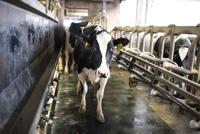
A cow walks into the milking area at a dairy farm in Adams. Watertown Daily Times
“They were struggling going in, and they probably could have pushed through, but with what happened with COVID-19, it basically shut their ability to ship milk out,” Mr. Laisdell said. “So, with that, and the farms living on paycheck to paycheck, they just called it.”
At the same time, Laisdell Dairy Systems was beginning to realize how serious the situation was becoming for the farms it supplies, as well as the business itself.
“When we lost that farm, it really caused depression amongst us,” Mr. Laisdell said. “It kind of really bummed us out and brought us down to really think that, ‘Wow, we’re in this for a while and we’ve really got to go ahead and help our customers out the most we can.’”
Going into the second month of the pandemic’s effect, because contracts were stopping for farms, processing plants were not processing fluid milk to go out to stores, schools or restaurants in response to lessening demand.
“The milk keeps flowing, it goes to the processing plant and then, all of a sudden, it stops,” Mr. Laisdell said. “And then they open up drains. Huge co-ops, huge processing plants are dumping milk down the drain. All of a sudden, we’re seeing thousands and thousands of gallons go into the drain. And you say, ‘Well, why don’t they make it into cheese and so forth like that?’ They can’t, they’re contracted to process milk in a certain way.”
According to Mr. Laisdell, with milk prices, there is normally a cycle through the year of peaks and valleys. Due to large consumers of milk like schools and restaurants closing, the milk prices experienced a valley earlier than usual. Instead of seeing prices climb as they normally would for the summer and fall, they took a dive.

Excess milk drops onto the floor. Watertown Daily Times
“This is where the government was trying to step in,” Mr. Laisdell said. “Support systems did come through; unfortunately, there were a couple of farms that didn’t make it. But, for the most part, they did come through and supplement those farms with some government programs and it probably saved a huge number, more than people will ever probably realize.”
Laisdell Dairy Systems carries accounts receivable for the work they’ve performed on various farms because, oftentimes, farmers aren’t able to pay the day those services are supplied. But if a farm is dumping milk because they’re not bringing money in, how do they pay their bills?
According to Mr. Laisdell, Laisdell Dairy Systems has to act like a financial company to hold bills for various farms and, in doing so, didn’t see that cash flow coming in for a long time.
“So we fall victim, too, to that big economic circle of life that comes around,” he said. “And so by the third month, we were definitely feeling that in our accounts receivables, because the farms just weren’t able to make their payments.”
Coping with losses during this time, Laisdell Dairy Systems held to the mentality that they couldn’t let things slow down, couldn’t show weakness to their customers who were already dealing with so much. Continuing to say, “If you need us, we’ll be there,” the company just had to alter the way in which it was there for them, according to Mr. Laisdell.
“Laisdell Dairy Systems ... we just want to continue to drive on right now, especially over the course of the next six months, to get back to that normal status with our customers and such,” he said. “We will, as we have for the last 40 years, continue to support the agricultural community and Jefferson County.”
When shutdown orders for restaurants across the state came in March in response to the pandemic, what came to Nick Kilionski’s mind was a simple drive to make everything work.
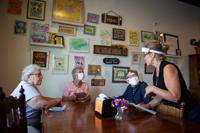
Dawn M. Roddie, right, co-owner of The PB&J Cafe in Lowville, takes customer orders at the cafe on Aug. 18. Kara Dry/Watertown Daily Times
A partner at the PB&J Café in Lowville, Mr. Kilionski said the owners were on vacation when shutdown orders came, so at the time it was down to himself and another employee to scramble and quickly do things as best they could for the day, not knowing what was coming next.
The café ceased dine-in operations due to the shutdown and pivoted toward a take-out and drive-through service model.
“We opened up one of our windows behind the counter and people adapted to that pretty quickly,” Mr. Kilionski said. “Customers really liked that a lot because everybody likes a drive-thru. We just started doing more take-out, and we also let our customers know that we would offer free delivery for the COVID time. And a lot of businesses, a lot of offices in town utilized that, so that brought in some bigger orders.”
When the restaurant first started doing drive-through and more takeout orders, no one was sure if they would bring in the same revenue as the dine-in service because the model of the business is to get people in the door, have them sit down, soak in the comfortable atmosphere, and stay as long as they want.
According to Mr. Kilionski, early in April, those at the café were considering closing the restaurant temporarily. He said that was a tough decision to face because they felt overwhelmed by the rules and regulations that were coming down. Especially in April, Mr. Kilionski noted that everything felt very disorganized and up in the air.
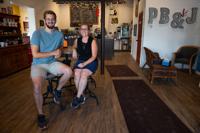
Nick A. Kilionski and Dawn M. Roddie, co-owners of The PB&J Cafe in Lowville at the cafe on Aug. 18. Kara Dry/Watertown Daily Times
The decision was made to remain open, keep their heads down and do the best they could at the café, which Mr. Kilionski said turned out to be the right one as business is going well thanks, in large part, to support from the community.
“We were really fortunate that our customers kept us open,” he said. “Community support has been phenomenal. For the entire duration of specifically the closure of the dine-in and even into the reopening of dine-in, customers were very generous. We saw a lot of high tipping. We’re not really a business that asks for tips, we don’t really solicit tips or anything like that, but customers would come in and they would just give you cash and say, ‘Keep it,’ and it was well over their order amount.”
In June, the business was presented with another opportunity to expand in a way they hadn’t tried before: outdoor dining.
Gathering some tables and placing them outside, those at the café decided to test the waters and see how it went. According to Mr. Kilionski, customers were happy to be able to come to the restaurant and actually stay and eat. Whether it was inside or outside, he doesn’t think it mattered.
Because it seemed to work so well, the tables remained even after the restaurant was allowed to open for dine-in services once more.

Far right, Dawn M. Roddie, co-owner of The PB&J Cafe in Lowville, takes customer orders at the cafe on Aug. 18. Kara Dry/Watertown Daily Times
Seeing a lot of the same faces at the restaurant each day, so familiar they feel like friends, has been a wonderful element of the past few months for those at the café. Mr. Kilionski said he enjoys seeing the same people out in the community that have been frequent visitors to the restaurant, that even through the craziness of this time, meaningful relationships have been forged with the customers that have helped the business remain in the community.
“I think we’re adapting; I think people are adapting,” Mr. Kilionski said. “We’re all getting used to this new thing that we’re all having to deal with. And we certainly hope that some of it goes away by at least the new year, maybe sooner. But right now, our heads are down and we’re just trying to keep up with what’s happening now. And as long as we’re busy and as long as we’re meeting people’s needs and people are coming in the door and everyone’s happy, then we’re happy.”
At 3 Bears Gluten Free Bakery and Café in Potsdam, despite losing a pre-order of $18,000 in March, co-owner Christopher Durant worried more about his customers and how he was going to provide those in the area with the product they needed rather than how his business would survive.
The bakery was able to stay open despite March shutdown orders due to the fact that the business is considered a medical necessity for those who must eat gluten-free.
“Celiac is considered a silent killer, it can hurt people permanently and it can kill people in extreme cases,” Mr. Durant said. “So, my biggest concern was, how do we keep it open and safely, not only for my customers, but my staff too.”
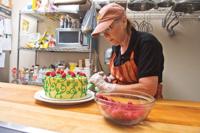
3 Bears Gluten Free Bakery owner Faye Ori decorates a custom cake in the bakery kitchen in Potsdam last year. Christopher Lenney/NNY Business Magazine
When things began to unravel in March, Mr. Durant recalls being concerned with just how bad things would get and whether he would need to lay people off or if the government was going to come to the aid of the business. For that first month, business was extremely affected due to the amount of money lost, as well as employees being concerned about the pandemic.
“I had employees that didn’t want to come to work, I had customers that didn’t even want to come to the store because they were afraid to even leave their house,” Mr. Durant said. “So as far as that first month, it was devastating.”
In Mr. Durant’s view, one of the hardest problems was when the government was giving $600 on top of unemployment, making it an attractive option for employees who were nervous to come back to the bakery. When the colleges in the area vacated, he said the business lost almost 50 percent of its staff.
Another problem came from the continued need for products while prices kept climbing. As a bakery, 3 Bears uses large quantities of eggs, milk and more specialized products like rice flour that can’t be picked up at the grocery store, instead needing to be ordered. Mr. Durant said product tripled in cost and oftentimes took anywhere from one to three weeks to be delivered.
In May, he considered closing the store.
“The thoughts that went through my mind is if I did, how were all these people that supported me for five years going to survive?” Mr. Durant said. “I had regular customers calling up worried that we were going to close because they couldn’t find bread locally. They couldn’t find anything to eat locally because stores were running out. My rent went up, cost of goods went up. It got more and more difficult.”

A bear holds an assortment of cupcakes at 3 Bears Gluten Free Bakery in Potsdam last year. Christopher Lenney/NNY Business Magazine
Fortunately, the café had some money banked in an emergency fund to help carry it through and business picked up once more. In addition to the emergency funds, the business also benefitted from the Paycheck Protection Program and an Economic Injury Disaster Loan.
Another thing the business wouldn’t have survived without is its loyal customers.
To begin with, the café couldn’t seat anybody in the store, instead having to turn to curbside business. They also did a little bit of delivery, but the bulk of business was mostly curbside and carry-out at the time. And the customers just kept on coming. According to Mr. Durant, if a business gets an 18 or 20 percent return rate on customers, they’ve got a good rate.
Offering foods like wraps, fries, chicken wings and pizzas alongside a large assortment of bakery goods, all of which are fully gluten-free, 3 Bears has a 55 percent return rate in customers, according to Mr. Durant. “That’s one thing about my customers I’ve got to say, I probably have the best customers that I’ve ever seen of any business I’ve ever been at,” he said. “I had a lot of regulars coming in and buying gift certificates, and they haven’t even used them yet. They just bought them to help us put money in the bank, and they just kept on coming back.”
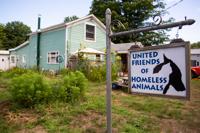
United Friends of Homeless Animals shelter in Richland. Kara Dry/Watertown Daily Times
At United Friends of Homeless Animals in Richland, volunteers normally come in to help clean the shelter and socialize the animals, a practice beloved by both the animals and their human volunteers.
When the shelter had to switch to a new way of doing things amid COVID-19, it closed down to volunteers, meaning the work landed more on shelter manager Kate Gonzales and her co-worker, the two going in daily to not only do the work they would normally do, but the extra tasks usually covered by the shelter’s volunteers.
Adapting to operations amid the pandemic, the shelter started doing applications with appointments, allowing visitors to come in at a controlled rate as the shelter was able to keep track of the number of people in the building at any given time. Now that volunteers are back at the shelter on certain days, this method is still being utilized.
Mrs. Gonzales lives on the property with her family, allowing her to also schedule appointments for evenings, afternoons and weekends. She said the shelter has seen a steady stream of adoptions in recent months.
“I honestly was a little nervous because I was worried that people would go back to work and want to then bring the animals back,” she said. “We did not see an increase in animals being surrendered; we saw an increase in adoptions during that quarantine time, but there was a family who in the midst of the pandemic had to surrender their cats because they could not afford to keep them because they had lost their jobs.”
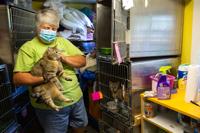
Weekly volunteer Judy J. Greene puts a cat back in their cage after cleaning it in the recent intakes room at the United Friends of Homeless Animals shelter in Richland on Aug. 19. Kara Dry/Watertown Daily Times
To cope with the closure of business and the loss of volunteers, the shelter turned to online fundraising through Facebook.
“We used Facebook because we have a large social media following and we specifically geared it for a special needs fund, which we have some animals that need more surgery or tests than others,” Mrs. Gonzales said. “And this way, when I go to the vet, I can say, ‘Yes, we can do that.’ Otherwise, we have to raise the money, so we try to keep a little bit aside so that’s an option. We also did one because we’ve missed out on several of our large events and we were unable to do fundraisers in the community.”
One such Facebook fundraiser involved raising money for special dog leashes that didn’t need to be washed and instead could be wiped down with Lysol wipes, allowing volunteers to go in and not have any contact with shelter staff, instead just being able to pick up leashes and go socialize with the dogs at the shelter.
According to Mrs. Gonzales, fundraising exceeded the shelter’s expectations, with leftover funds put toward toys for the dogs due to the fact that they weren’t getting the socialization they normally would during that time.
The shelter’s primary storefront is a thrift store in town called the UFHA Thrift Store, which completely shut down for months. During that time, projects that had been on the to-do list were completed, like redoing the floors, rearranging the place and installing a new counter that had been sitting in a shed for over a year.
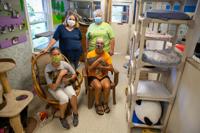
Back row from left: United Friends of Homeless Animals Shelter Manager Kate E. Gonzalez, volunteer Judy J. Greene, and front row from left, volunteers Anne E. Derr and Shirley A. LaFontaine in one of the cat rooms at the shelter in Richland on Aug. 19. Kara Dry/Watertown Daily Times
According to Mrs. Gonzales, the store is now open and doing better than ever with people coming in and supporting the cause.
A common thread through the shelter’s fundraising efforts, the reopening of the thrift store, and UFHA’s journey through the pandemic so far has been community support, which Mrs. Gonzales described as amazing.
“We had people in the very beginning donating tons of food and litter, which helps immensely with our budget because sometimes we do have to order out those things,” she said. “And then the Facebook fundraisers were huge. So even though we weren’t out in the community like we usually are, they definitely were there to support us.”
"story" - Google News
October 18, 2020 at 10:30AM
https://ift.tt/31kciK3
More to the Story: North country businesses reflect on COVID-19 pandemic, overcoming challenges - NNY360
"story" - Google News
https://ift.tt/2YrOfIK
https://ift.tt/2xwebYA
Bagikan Berita Ini















0 Response to "More to the Story: North country businesses reflect on COVID-19 pandemic, overcoming challenges - NNY360"
Post a Comment